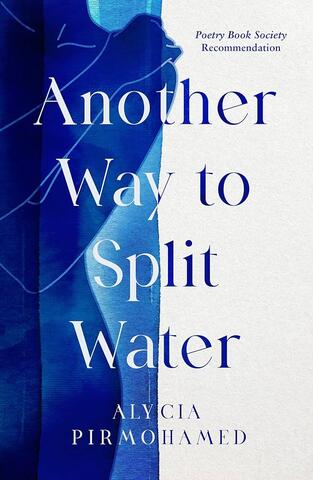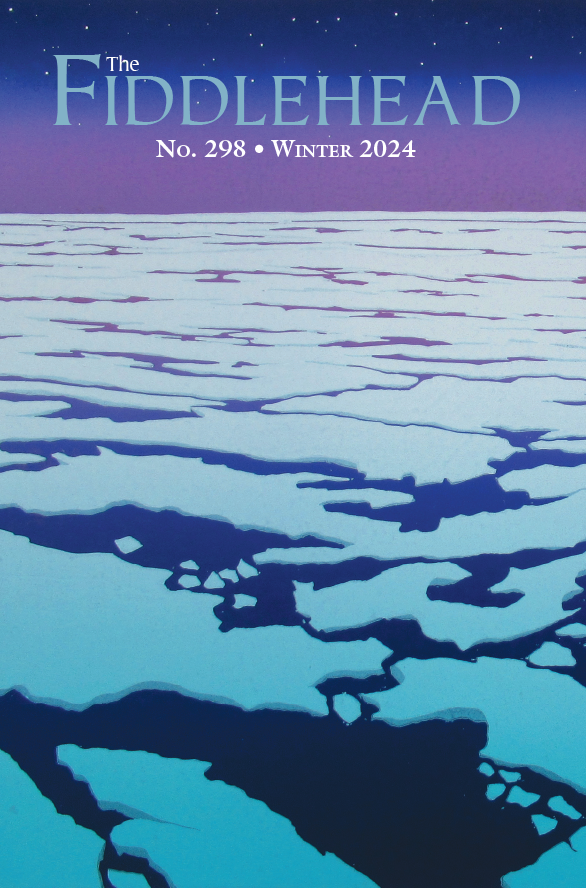
I could think of no better way to begin this review than by diving immediately into the free-flowing, elusive, and mystical current that is Alycia Pirmohamed’s mind in her debut book, Another Way to Split Water. These poems navigate the spooling and unspooling, the fissuring and twinning and halving of worlds that occurs in the poet’s contemplation of her mixed cultural identity; what it means and how it feels to be a living embodiment of diverse places and histories. Pirmohamed, winner of the 2019 CBC Poetry Prize, was born in Alberta and now lives in Scotland. Her parents, born in East Africa, immigrated to Canada, and in an interview with CBC, the poet mentions having Indian heritage as well.
In Another Way to Split Water, the reader is drawn into the abyssopelagics of paradoxical truths — that the self is one and many, broken and whole, that in absence there is presence, and that, ultimately, one can find a home, a sense of identity, within unknowing and uncertainty. These poems took my breath away and left me stunned. They quenched a thirst I wasn’t even aware I had — a thirst for contemporary poetry with a spiritual reverence, evoking mystery and longing.
One of my favourite elements of this book is how Pirmohamed creates her own self-mythology with a host of reoccurring images: elk, rivers, ghosts, storms, swans, seeds, moons, to name a few. These are some of the key motifs that come and go throughout the book, interlacing with the poet’s manifold identity: “how all of these names describe the way / we coexist / & exist within one another.” The coalescence of the poet’s inner world with the more-than-human outer world is one of the constant “weavings” that Pirmohamed performs:
Of all the reoccurring motifs, water is the primary and most prevalent since it is one that easily embodies the paradoxes that are of keen interest to the poet. Bodies of water are sources of connection and separation, of borders and crossings, all of which are at the crux of Pirmohamed’s contemplation of self and ancestry. “Her mother crossed water and split into so many / particles that at last, she became a discord of countless things,” she writes, and, “Listen, I expected the Atlantic to show me / all that ruptured when woman after woman after locust / crosses an ocean.” The ocean symbolizes a rift in the poet’s identity that she has to reckon with while trying to orient herself within her divided familial history. This book, from my view, is “a bridge that crosses the chasm.”
The word “chasm” reappears throughout the poems, along with words such as “twin,” “split,” “halved,” “cleaved,” and “doubled.” But amidst all of this “doubling” and “cleaving” are images of “weaving,” “spooling,” “yoking,” which frequently called to my mind the double-helix, the physical structure of DNA: “two linked strands that wind around each other to resemble a twisted ladder in a helix-like shape” (National Human Genome Research Institute). Life itself is founded on doublings and weavings. With this image in mind, Another Way to Split Water doesn’t so much map an experience of trying to mend division but rather to hold the division of many disparate parts, and in this act of convergence we find creation. Pirmohamed gathers all her “loose ends” and creates a wavering, mythical mosaic that gives home to the various ruptures and divisions of self:
There is a sense of departure, an awareness of leaving and loss, throughout this book, but somehow these absences seem to be one of the keys that unlock the speaker’s sense of identity. She contains these departures, these distances and unknowns — all the “kilometres [her] longing has travelled” — and it’s not in any arrival at some fixed point in the past, or understanding of it, that she finds herself, but rather in fluidity, in burgeoning ever forward:
Braided with her longing for self-understanding is the speaker’s spiritual seeking. Images and phrases of Islamic prayer are beautifully laced throughout these poems. Pirmohamed often alludes to the Tasbih, which I learned is a form of dhikr, an Islamic prayer that repeats certain phrases in remembrance of God, and bismallah, which in Arabic translates to “in the name of God” and is one of the most important phrases in Islam, oft repeated throughout the book. Many of these poems read like prayers in their hunger for deeper connection and greater understanding: “my heart unspools like the language of my prayers. / Site of drool and hunger, my mouth withholds a waterlogged / bismallah.” Similar to the point made above — that the poet finds a blossoming of self within unknowing — a haunting absence/presence emerges from within her spiritual longing:
Religion is a root of connection to Pirmohamed’s family history and culture, and yet it is also described as a source of alienation and suspicion when presented within the context of her childhood in the Canadian prairies and growing up in the wake of the terrorist attacks on September 11, 2001: “the split / into them and us once the towers fell.” This line is quoted from the poem “Welcome,” the opening poem of the book’s second section. It is a heartbreaking poem about the speaker’s experience of racism as a child in her home country:
Here, we get a glance at how a country and culture can make one feel broken, alien, and unrecognizable to oneself in its racist and skewed depictions of cultural identity. So not only does the speaker have to reckon with all of the mysteries and complications of her own self-image but also with the harmful and dangerous illusions that are projected onto her from the culture she was born into. Given the most recent ruptures of cultural and religious violence in the world, and the racism that is spreading in its wake, this awareness of how easy it is to misperceive and project our fears onto people of different ethnicities seems all the more crucial. Something to heed as its harms are ever mounting . . .
Another Way to Split Water is, at last, a mystifying and spellbinding journey. Readers will marvel at the exquisite mysteries and criss-crossings that are at the heart of Pirmohamed’s expressions of selfhood, family history, spirit, and longing. It is not an easy journey with a fixed, predetermined arrival. Instead it is a braiding of various arrivals and departures, of inner and outer landscapes, of yearning in which the poet locates a sense of identity that is both fluid and fragmented, and a home that is found everywhere and nowhere in her graceful wandering:












